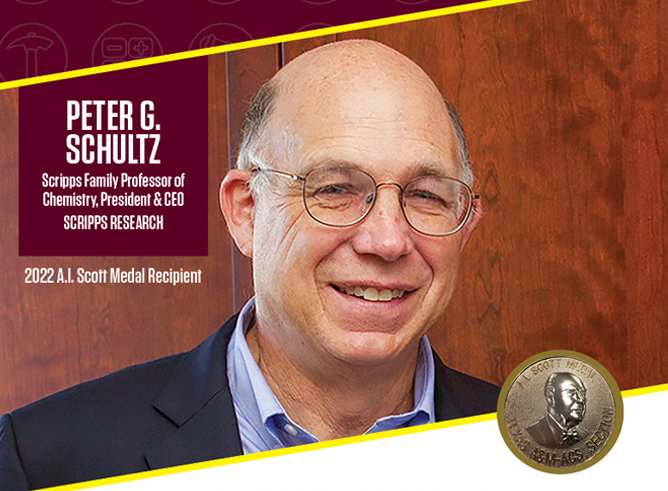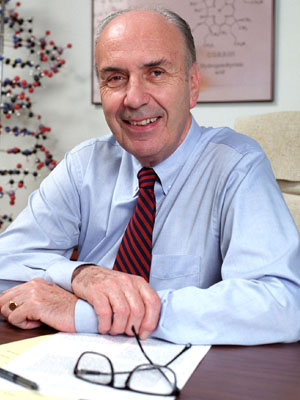
Peter G. Schultz, Scripps Family Professor of Chemistry and president and chief executive officer of Scripps Research, has been selected as the 2022 recipient of the A.I. Scott Medal for Excellence in Biological Chemistry Research, named for one of the leading faculty members in Texas A&M University's rich chemistry-related history.
The medal is jointly awarded each year by the Texas A&M Department of Chemistry and the Texas A&M Section of the American Chemical Society (ACS) in tribute to Dr. A. Ian Scott, a Texas A&M distinguished professor of chemistry who made tremendous scientific contributions, both to the university and to the international chemistry community, during his 30-year career.
Schultz will be honored during an afternoon symposium set for Friday, Oct. 21, within Texas A&M's Interdisciplinary Life Sciences Building. In addition to Schultz's 4:30 p.m. keynote presentation, "Playing With the Molecules of Life," the event will feature preceding talks by University of California, San Francisco, chemist Kevan Shokat and California Institute of Technology chemist Linda Hsieh-Wilson. The symposium will be followed by an invitation-only dinner, at which Schultz will be presented with the Scott Medal.
 Scott was a pioneering chemist who came to Texas A&M in 1977 and achieved worldwide recognition for his discovery of how bacteria produce vitamin B12 as well as his study of the cancer drug taxol. Named a distinguished professor of chemistry and biochemistry at Texas A&M in 1981, Scott held the Robert A. Welch Chair in Chemistry and also was the D.H.R. Barton Professor of Chemistry. He contributed to numerous other works, including breakthroughs related to the essential life pigments chlorophyll and heme along with antibiotics that fundamentally impacted the field of biosynthetic investigation and helped revolutionize both organic and natural product chemistry, before his untimely death in 2007 at age 79.
Scott was a pioneering chemist who came to Texas A&M in 1977 and achieved worldwide recognition for his discovery of how bacteria produce vitamin B12 as well as his study of the cancer drug taxol. Named a distinguished professor of chemistry and biochemistry at Texas A&M in 1981, Scott held the Robert A. Welch Chair in Chemistry and also was the D.H.R. Barton Professor of Chemistry. He contributed to numerous other works, including breakthroughs related to the essential life pigments chlorophyll and heme along with antibiotics that fundamentally impacted the field of biosynthetic investigation and helped revolutionize both organic and natural product chemistry, before his untimely death in 2007 at age 79.
Schultz earned his undergraduate (summa cum laude) and doctoral degrees at the California Institute of Technology. After postdoctoral studies at the Massachusetts Institute of Technology, he joined the faculty at the University of California, Berkeley, in 1985, where he was a chemistry professor, a principal investigator at Lawrence Berkeley National Laboratory and a Howard Hughes Medical Institute Investigator. He joined Scripps Research in 1999 and was appointed chief executive officer in 2015. The following year, he was named president of the institute.
Like Scott, Schultz has made many seminal contributions to the fields of chemical and synthetic biology, including the development and application of methods to expand the genetic code of living organisms, the discovery of catalytic antibodies, and the development and application of molecular diversity technologies to address problems in chemistry, materials science and medicine.
Schultz has founded nine biotechnology/technology companies that have pioneered the development and application of new technologies to challenges in human health and materials science. In 1999, he founded the Genomics Institute of the Novartis Research Foundation, serving as its director for more than 10 years. In 2012, he established CALIBR, a nonprofit biomedical research institute designed as a new model to accelerate the discovery of innovative medicines that is now an operating division of Scripps Research.
An elected member of the National Academy of Sciences, National Academy of Medicine and American Academy of Arts and Sciences, Schultz has co-authored more than 600 scientific publications and is active on many editorial and scientific advisory boards. He has trained in excess of 300 graduate students and postdoctoral fellows, many of whom are on the faculties of major research institutions around the world. Schultz has received numerous prestigious awards, including the Wolf Prize in Chemistry, the National Science Foundation’s Alan T. Waterman Award, the Solvay Prize, the Paul Ehrlich and Ludwig Darmstaedter Prize, the American Chemical Society’s Arthur C. Cope Award, the Heinrich Wieland Prize and the NAS Award in Chemical Sciences.
For more information on the Scott Medal Symposium, contact Texas A&M Chemistry at (979) 845-9829 or via email at chemhead@chem.tamu.edu.
